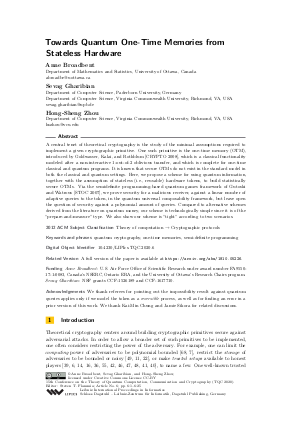@InProceedings{broadbent_et_al:LIPIcs.TQC.2020.6,
author = {Broadbent, Anne and Gharibian, Sevag and Zhou, Hong-Sheng},
title = {{Towards Quantum One-Time Memories from Stateless Hardware}},
booktitle = {15th Conference on the Theory of Quantum Computation, Communication and Cryptography (TQC 2020)},
pages = {6:1--6:25},
series = {Leibniz International Proceedings in Informatics (LIPIcs)},
ISBN = {978-3-95977-146-7},
ISSN = {1868-8969},
year = {2020},
volume = {158},
editor = {Flammia, Steven T.},
publisher = {Schloss Dagstuhl -- Leibniz-Zentrum f{\"u}r Informatik},
address = {Dagstuhl, Germany},
URL = {https://drops.dagstuhl.de/entities/document/10.4230/LIPIcs.TQC.2020.6},
URN = {urn:nbn:de:0030-drops-120654},
doi = {10.4230/LIPIcs.TQC.2020.6},
annote = {Keywords: quantum cryptography, one-time memories, semi-definite programming}
}

 Creative Commons Attribution 3.0 Unported license
Creative Commons Attribution 3.0 Unported license








































